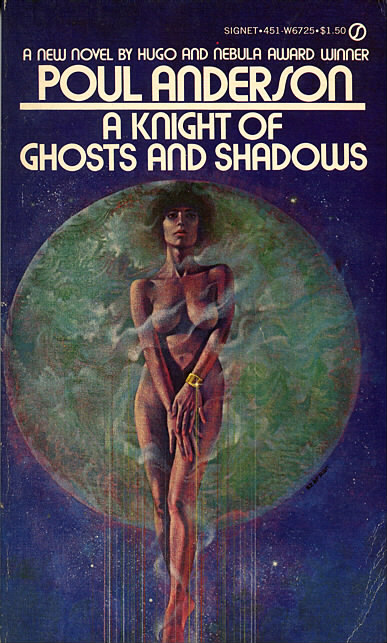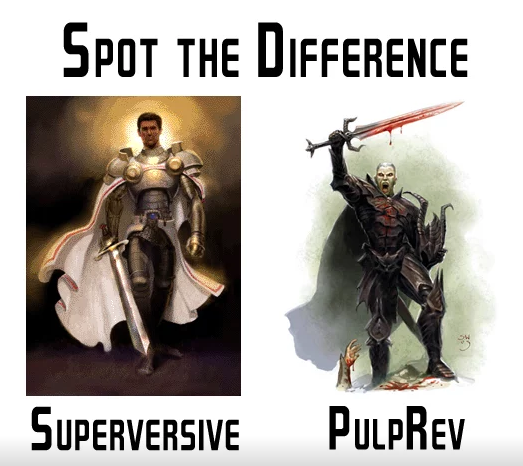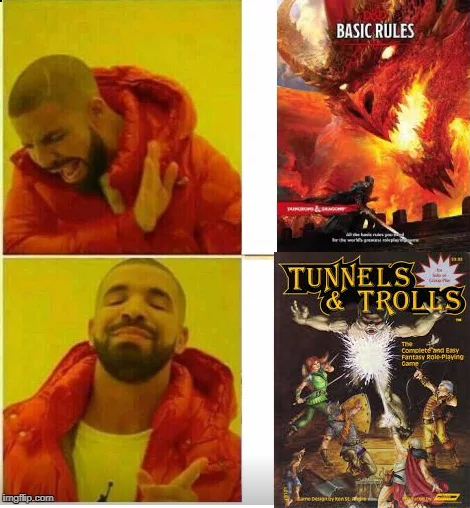SENSOR SWEEP: Offended Patrons, In-game Relationships, Jaded Industry Insiders, and All-knowing Prophecy
Monday , 31, July 2017 Sensor Sweep 15 Comments D&D (Cirsova) D&D Alignment Part 2: D&D’s Cosmology — “Picking an alignment which fits your character’s personality and shaping the cosmos around those characters’ alignment choices is doing it backwards, which is why many people find alignment rules baffling. Unless you are actually using AD&D’s implied setting and cosmology, of course, there’s no mechanical reason to keep alignment. It becomes almost purely cosmetic since players and DMs use it mostly as a personality marker. It can be entirely discarded because it’s a rule that explains a character’s relationship to 1e AD&D’s batshit cosmology!”
D&D (Cirsova) D&D Alignment Part 2: D&D’s Cosmology — “Picking an alignment which fits your character’s personality and shaping the cosmos around those characters’ alignment choices is doing it backwards, which is why many people find alignment rules baffling. Unless you are actually using AD&D’s implied setting and cosmology, of course, there’s no mechanical reason to keep alignment. It becomes almost purely cosmetic since players and DMs use it mostly as a personality marker. It can be entirely discarded because it’s a rule that explains a character’s relationship to 1e AD&D’s batshit cosmology!”
Real Writers (Seagull Rising) Two Paths Converged — “Instead of dedicating long hours to tradecraft, the hikers on this path opt to spend time ingratiating themselves to those at the top of the path. They rely on the hard won successes of others, grasping at coat-tails in the hopes that they may be able to ride them upwards. Lined with fan conventions, cocktail parties, and rigged award ceremonies, it appears to be a life of relative ease, but it is not without cost. To ascend this path, one must actively discourage fellow hikers lest they usurp your position as the chosen one. One must carefully guard his speech lest he offend their patrons and be cast back down the hill. Part of the price of this path is the loss of freedom the author suffers – the author who chooses this path will forever be subject to the whims of his patrons, unlike those who take the former path.”
Pulp Revolution (Hollywood in Toto) Why Pulp Revolution Is Perfect Response to 24/7 Politics — “It’s a proven fact that a dismissive, and even downright hostile, attitude towards the audience is a killer for an industry. Take a look at Marvel Comics. By doubling-down on the ‘correct’ political message and depicting differing worldviews in an inaccurate and insulting light, its readership has fallen to the point that its comic wing is essentially irrelevant, existing mainly to maintain the copyrights needed for use in its other, more profitable ventures like movies. The publishing industry has seen a similar trend.”
Appendix N (Cirsova) Alignment Part 3: Some Examples! — “While Robin Hood lived in the wilds and opposed King John and the Sheriff, he was not doing so from an angle meant to upset Nature’s law and/or the will of the heavens. On the contrary, he understood the natural and divinely bestowed rights of Man and fought against a power that was usurping them. Additionally, the power he opposed (John and the Sheriff) are portrayed as being in opposition to the rightful rule of King Richard – in this sense, Robin has positioned himself as an agent of the legitimate and rightful law that is respectful of the rights of man, acting on behalf of Richard, the true authority. Though certain trickster elements are incorporated, the classic portrayal of Robin Hood throughout many iterations in the 19th and 20th century* would be Lawful Good.”
Giants of Gaming (Save Versus All Wands) Bob Bledsaw Jr. on Gary Gygax, Dave Arneson and his Father: “These were good men.” — “Bledsaw Jr. doesn’t hold back on mentioning his father’s personal weaknesses and failings, and at one remove, some of the imperfections of his father’s partner, rival and friend, Gygax. There are elements of a soap opera. Or a tragedy. But another thread also runs through the entire talk – that of the admiration and personal respect he came to have for all of them. Or as Bledsaw Jr. put it, midway through his presentation: These were good men. These were moral men.”
RPGs (Walker’s Retreat) My Life as a Gamer: Rethink Your RPG Designs, People — “Done properly, you spent plenty of time–real and game–at a given level before advancing to the next. As you leveled up, time-in-level increased significantly. The only way to cut this time down was to take the risk of facing greater challenges, and in that same properly-run game that became a challenge to itself; you had to actually find them first, and then you had go to them in the hopes that another party didn’t beat you to the punch, during which time you had better have done your homework and prepared accordingly to beat the thing. In Original and Basic D&D, this was more implicit than explicit; AD&D laid this out better, but still unclear to anyone not already immersed in wargaming campaigning and the mindset required to succeed therein.”
 D&D (Gaming While Conservative) The Dungeon – Fifth Edition — “Her lack of enjoyment rubbed off on everyone at the table. Afterwards, she explained that it all felt really cold and clinical. It was all about the numbers and the logic puzzles, with none of the drama and in-game relationships that she wanted out of her gaming. I explained that what we do at my table is real RPGs, not fake RPGs like storygames. Ever the helpful soul, I pointed her towards titles like Dungeon World, and Maid, and something with anime characters on the cover. You know – not-RPGs.”
D&D (Gaming While Conservative) The Dungeon – Fifth Edition — “Her lack of enjoyment rubbed off on everyone at the table. Afterwards, she explained that it all felt really cold and clinical. It was all about the numbers and the logic puzzles, with none of the drama and in-game relationships that she wanted out of her gaming. I explained that what we do at my table is real RPGs, not fake RPGs like storygames. Ever the helpful soul, I pointed her towards titles like Dungeon World, and Maid, and something with anime characters on the cover. You know – not-RPGs.”
Appendix N (Adventures Fantastic) Happy Brithday, Farnsworth Wright — “By the time of his death in 1940, Farnsworth Wright had become one of the most influential editors the field of the fantastic would ever see. Wright was born in 1888 on July, 29. I would argue his influence on science fiction, fantasy, and horror has been greater than any other editor, including John W. Campbell, Dorothy McIlwraith, Fred Pohl, Ray Palmer, or Hugo Gernsback.”
RPGs (Ron Edwards) Being, having, and nothingness — “In the first-generation Championscore texts (1st-3rd edition), the non-super, relatively usual components of the character are entirely not built with points. There are very few skills and those are all exaggerated: comics-style acrobatics, comics-style combat acumen, comics-style beat-the-security, comics-style computer wizardry, et cetera. Everything else, especially money, Bruce Banner’s homelessness, Peter Parker’s photography and associated job, Tony Stark’s fortune and business holdings, Doctor Doom’s whole damn country and its resources – all of them are equal in this iteration of Champions, and gain or cost nothing in game-terms points. If you want to use these things in play, regarding all manner of very consequential details like status, resources, and a myriad of implicit attitudes, influences, and problems, you treat them as soft special effects and just harden’em up in the moment and do it. Doesn’t matter if it’s buying a yacht or panhandling – see what the character’s background and identity are for those things, and play him or her as doing anything those things imply.”
Television & Movies (RMWC Reviews) The Geek Culture™ Apocalypse — “All of these are big, big franchises. All of them have a huge media presence. All of them are seeing declining audiences or behind the scenes trouble or relying on manufactured controversy to draw attention. All of them are cornerstones of modern Geek Culture™ that have cottage industries of t-shirts, toys, games, podcasts, mugs, etc. built up around them. My gut tells me that 2018 will be the moment where it all comes crashing down. The best part is, I don’t know what’s going to rise up to take their place, which is the first time in a decade where I could say that.”
Hard SF Considered Harmful (Jon Del Arroz) YA vs. “Real” Sci-Fi and Fantasy: It’s about Mindset — “It actually is a change from the way Sci-fi used to be from prior to the 80s to now. In the old days,fun adventure, exciting characters and their circumstances used to be what was dominant in the field, and was subsequently replaced by extreme vetting of what ‘could really happen’ that began with jaded industry insiders, and trickled into the ever diminishing SF/F reading public. This is the exact reason why science fiction has been bleeding readers for years — as most people who do want to read do so for escape, and for fun, they don’t want to be bogged down in perceived real world problems extrapolated into space and made into dark, gritty, angry messages that revolve around heavy scientific concepts that may or may not be feasible anyway.”
 Appendix N (Black Gate) A Tale of Two Robert E. Howard Biographies — “I often tired of De Camp’s sort of armchair-Freudian-psycho-analysis. I won’t go into the details of REH’s life, but he clearly had a close relationship with his mother. And coming back to De Camp’s overall REH narrative I alluded to before, De Camp often would heavily suggest and emphasize what he saw as sort of pent-up sexual issues within REH’s life related to this relationship. I’m not criticizing this suggestion in itself. In fact, I’m sure that De Camp was onto something. But De Camp often veered from competent history into mind-reading, all-knowing prophecy of REH’s intentions and personal issues. Give me a break!”
Appendix N (Black Gate) A Tale of Two Robert E. Howard Biographies — “I often tired of De Camp’s sort of armchair-Freudian-psycho-analysis. I won’t go into the details of REH’s life, but he clearly had a close relationship with his mother. And coming back to De Camp’s overall REH narrative I alluded to before, De Camp often would heavily suggest and emphasize what he saw as sort of pent-up sexual issues within REH’s life related to this relationship. I’m not criticizing this suggestion in itself. In fact, I’m sure that De Camp was onto something. But De Camp often veered from competent history into mind-reading, all-knowing prophecy of REH’s intentions and personal issues. Give me a break!”
Literature (Vintage Novels) Henry IV, Part 1 by William Shakespeare — “If Hotspur primarily serves as a foil to Hal, someone King Henry can wish loudly had been his own son rather than Hal, then Sir John Falstaff serves as a foil to King Henry, Hal’s other father figure. Falstaff is the dark horse in this play’s ensemble, a character so enjoyable in his cunning cowardice that he has passed into literary legend. He’s regularly compared to the Vices in a morality play, his main aim being to lead youth astray. And Shakespeare definitely encourages the audience to boo him. Whether pressing unsuitable men into military service, or trying to get undeserved credit after the battle of Shrewsbury, at least some of Falstaff’s actions are intended to be sinister rather than comic.”
The link for Television & Movies (RMWC Reviews) The Geek Culture™ Apocalypse — Leads to Kestutis Kalvaitis Twitter page.
-
Television & Movies (RMWC Reviews) The Geek Culture™ Apocalypse
http://kestifer.blogspot.com/2017/07/the-geek-culture-apocalypse.html
-
Regardless of what calamity might happen, we can comfortably rely on Hollywood learning all the wrong lessons and continuing to subject us to crappy movies. Same goes for Marvel/DC and all the other stuff.
-
The superversive v. Pulp rev image cracked me up.
Thanks for sharing the guest post from HollywoodInToto.com — now, telling a simple story is subversive. Crazy times!
-
Agreed! Thanks for linking to the article!
I am continually surprised by how defensive the “tru fans” are about De Camp. Man was a poisonous little gnome.
-
From what I can tell, it’s really like one or two guys who make sure to descend on every single De Camp-related discussion on the internet (they’ll probably be here soon…).
“De Camp often would heavily suggest and emphasize what he saw as sort of pent-up sexual issues within REH’s life related to this relationship. I’m not criticizing this suggestion in itself. In fact, I’m sure that De Camp was onto something.”
Wasn’t REH’s mom a widow or at least the father was absent? And wasn’t his mother a bed sticken invalid with TB? And wasn’t REH an only child? And wasn’t when REH living with his mom in his mid to late 20’s DURING the friggin Great Depression?
I think I am on to something and it is a whiff of stench coming from BlackGate and I am almost certain a particular mendacious writer there is a heaping pile of S..
-
Yes, the father was a traveling doctor, so his work kept him on the road a lot, leaving REH as his mom’s primary caregiver.
-
Funny thing is that actual psychologists moved quite a bit past Freud already by the end of Jung’s generation. It is only these leftie pop intellectuals that can’t give up on this garbage in its early 20th century form, thanks to the likes of Lacan. It is just so very useful for them.
-
De Camp wasn’t particularly Leftist. His political views appear to have been roughly the same as ’50s-era Heinlein, whom he served with in WWII. Spraguey always seemed to pride himself on being fairly detached and pragmatic.
The de Camps used a female Texan psychologist to “help” posthumously psychoanalyze REH, though LsdC had been doing so long before he acquired her services. As you say, Freud served his purpose.
One of those paladins in the BG comments section tried to equate De Camp and Derleth. Well, I guess you can make comparison as far as milking existing properties and creating far inferior imitations that actually damaged the popular image of original. Key difference, though, is that Derleth actually adored Lovecraft and was obsessed with getting mainstream acclaim for Lovecraft’s fiction, whereas De Camp tried to character assassinate REH and did his best to belittle his fiction.
-
IMO, comparing de Camp to Derleth is a false equivalence on several levels. I’ll admit I once thought the same thing. I’d read much more by and about de Camp for several decades in contrast to Derleth. Having researched Augie pretty heavily the last several years, I have to say the differences far outweigh the similarities.
Derleth was a correspondent of Lovecraft starting in the late ’20s and that continued until HPL’s death. HPL encouraged Derleth at every turn. Compare that to zero personal contact between REH and Spraguey. There was simply no chain of “inheritance” whatsoever. De Camp insinuated himself into the Gnome Press publication of the Conan tales in the ’50s. He sunk his talons into the Conan property at that point and never, ever let go until his dying day. At the same time, he quite willfully ignored other REH heroes like Solomon Kane and Kull, doing little-to-nothing to promote them. By the ’90s, Spraguey oversaw a vast, steaming pile of TOR Conan pastiches while keeping the Robert E. Howard Conan out of print.
Derleth created the most revered small press fantasy/horror publisher in history: Arkham House. It was the hardcover equivalent of creating and editing Weird Tales, but much classier. Derleth didn’t just get HPL into print, he was also the first to get Robert E. Howard, Ray Bradbury and Ramsey Campbell into fine hardcovers for the first time, which bestowed a welcome glamour of quality upon them all. Spraguey did nothing remotely close to that.
If Derleth was truly comparable to ol’ Sly Spraguey, he would’ve just kept selling HPL reprints to the pulps, found some shady hardcover publisher to reprint Lovecraft, which would then tie up the legal rights for a decade. Then, Derleth would’ve licensed the Lovecraft tales to a third-rate Mafia front publisher who — after selling millions of copies of the HPL tales — promptly went “bankrupt”, thereby keeping Lovecraft out of the public eye for 5 years.
At that point, Derleth would’ve implemented his master plan of starting a line of “Cthulhu” paperbacks published through TOR which were conveniently titled “Cthulhu the Irascible”, “Cthulhu the Somnolent” and so on. Meanwhile, Derleth would quietly block any new editions of actual Lovecraft tales, especially ones that mentioned Cthulhu, even when others would try to reprint the original pulp versions which he didn’t have copyrighted. All the while, Derleth would go to parties attended by his peers and talk trash on HPL and Cthulhu, boast of his non-Cthulhu fiction and bemoan the fact that “Cthulhu is where the money is” while partying on Lovecraft’s dime.
Anyone more than vaguely familiar with Derleth’s life knows that isn’t remotely how it went — but that’s roughly how LSdC played his hand. If you want the best book published on Derleth, Lovecraft and Arkham House, this is it:
https://www.amazon.com/dp/B015NCZVD0/ref=dp-kindle-redirect?_encoding=UTF8&btkr=1